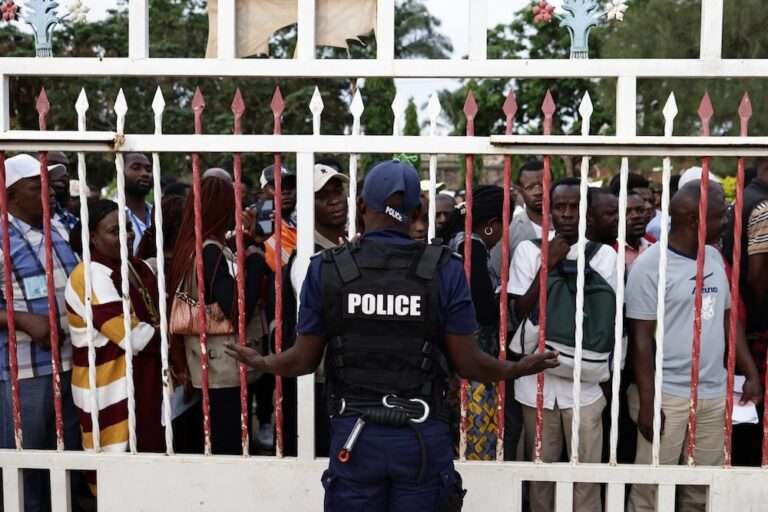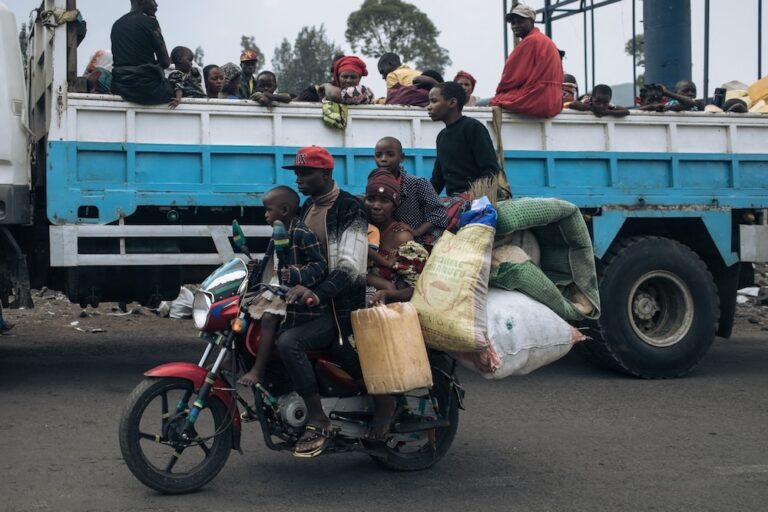(HRW/IFEX) – As President Clinton recognizes the efforts of civil society in Africa, civil society activists in the Democratic Republic of Congo (DRC) are facing new attacks from their government. On April 2 1998, Human Rights Watch (HRW) charged that the Congolese authorities are cracking down on numerous independent voices–including journalists, academics, development experts, and […]
(HRW/IFEX) – As President Clinton recognizes the efforts of civil society in
Africa, civil society activists in the Democratic Republic of Congo (DRC)
are facing new attacks from their government. On April 2 1998, Human Rights
Watch (HRW) charged that the Congolese authorities are cracking down on
numerous independent voices–including journalists, academics, development
experts, and in particular human rights defenders–in order to silence any
and all criticism of their increasingly repressive policies.
On April 2, President Clinton met with leaders of democracy and human rights
organizations from several African countries in the Senegalese capital
Dakar, including one from the DRC. “While the Congolese government is paying
lip service to human rights and making declarations about a transition to
democracy, these attacks on independent voices speak louder than their
words,” said Peter Takirambudde, executive director for Africa at HRW. “We
urge President Clinton to demonstrate his support for civil society in
Africa by publicly condemning these attacks,” he said.
The most recent attack on leaders of civil society in the DRC took place on
the night of 20 March, when four soldiers accompanied by a civilian forced
their way into the Kinshasa home of Floribert Chebeya, president of the
Voice of the Voiceless, one of the leading human rights organizations in the
country. The five attackers tied him up and took him at gun point to a
vacant lot where he was beaten severely with a rifle butt and kicked
repeatedly. After threatening to kill him, the attackers left with money and
valuables from his home. Though Chebeya, who has won the Reebok Human Rights
Award and who is internationally recognized for his organization’s
courageous efforts to defend human rights in the Congo under Mobutu, lodged
an official complaint with the police, the DRC government has failed to
investigate the crime.
This aggression against Chebeya is indicative of increasing government
attempts to stifle independent voices. In early March 1998, Pascal Kambale,
vice-president of the Association for the Defense of Human Rights (AZADHO),
was summoned to the National Security Council and questioned about the
sources of an AZADHO report on a civilian massacre perpetrated by government
soldiers in mid-February 1998 in the eastern town of Butembo. On 13 March,
the same day that a government conference on human rights in Kinshasa
released a declaration about the importance of human rights in national
reconstruction, agents of the national intelligence agency confiscated
hundreds of copies of AZADHO’s annual report about human rights in the DRC.
Attacks on the independent press and others who have written about human
rights abuses have been a key feature of the government’s campaign against
civil society. In late March, for example, customs authorities at Kinshasa
airport seized some 2,000 copies of the international edition of “Le Soft”
newspaper. This was the second edition of that paper to be seized that
month, and the fifth in eight months. In February, authorities detained the
editor of “Le Potentiel” for three days because of articles published in the
paper denouncing the arrest and banishment of opposition leader Etienne
Tshisekedi. In a related case, Roger Sala Nzo, secretary-general of the
National Human Rights Center, was arrested in Kinshasa on 23 November 1997
and detained for three months as punishment for the publication of a report
critical of rampant human rights abuses under the current government.
Human rights organizations have been a frequent target of the Kabila
government. Didi Mwati Bulambo, general coordinator of the Collectif
d’Action pour le Development des Droits de l’Homme (Collective of Actions
for Human Rights Development), was arrested and tortured by the army in
August 1997 in his native Mwenge district of South Kivu as punishment for
his human rights activism. At about the same time, Bertin Lukanda, of the
rights group Haki Za Binadamu (Swahili for “human rights organization”), was
arrested and tortured by soldiers in the eastern town of Kindu. His
tormentors accused him of spying for the United Nation’s investigation into
reports of refugee massacres in eastern DRC.
HRW believes that the DRC government targets Chebeya and other activists to
prevent them from defending and promoting human rights in their country. We
call on the DRC government to immediately cease attacks on civil society and
to conduct a thorough and independent investigation into these and similar
incidents in order to identify and punish those responsible for the
arbitrary detaining, beating and harassing civil society leaders and rights
defenders. HRW further calls on the U.S. government to offer visible,
high-profile support to those organizations involved in both the promotion
of human rights and the monitoring of their government’s respect for such
rights. The U.S. should also speak out publicly against governmental actions
that encroach upon the ability of these organizations to operate freely.


